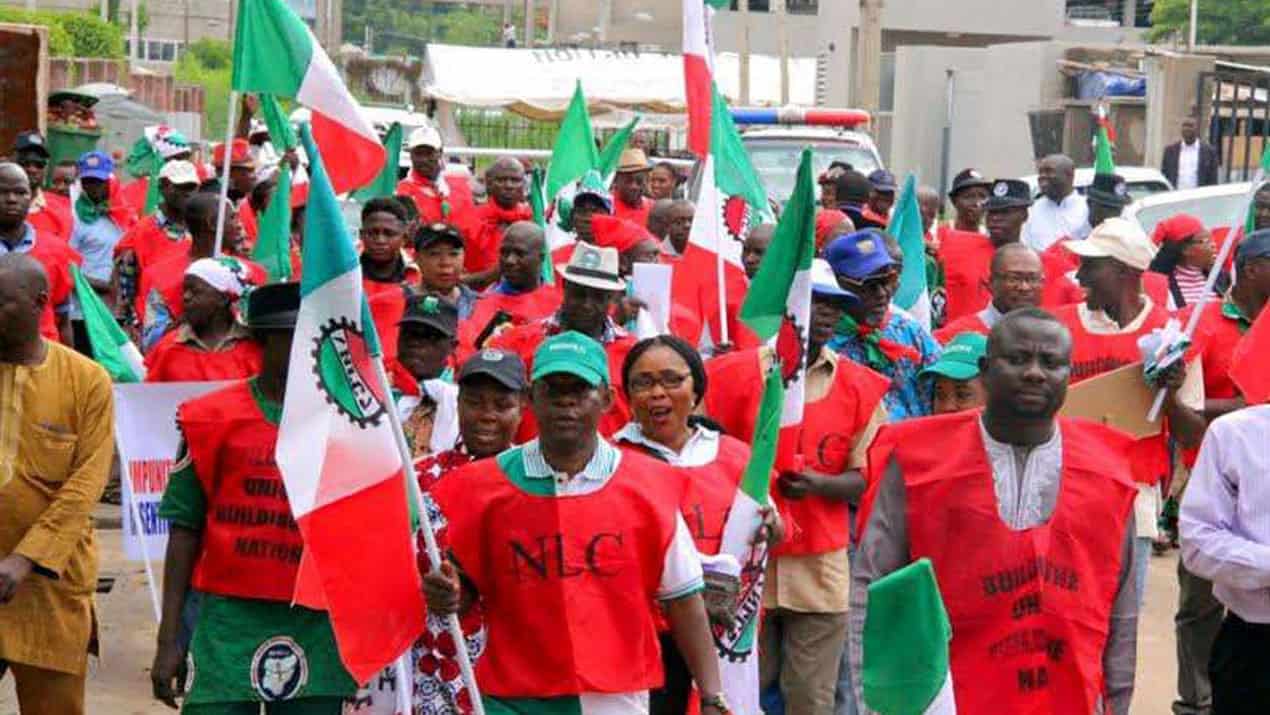Minimum Wage: Labour promises hell for dissenting governors
With President Muhammadu Buhari about to roll out a new salary package for civil servants, an influential workers union has promised tough times for governors who may not pay the new salary structure. The Secretary-General of the Association of Senior Civil Servants of Nigeria (ASCSN), Mr Bashir Lawal, restated on Wednesday, the resolve of workers […]

NLC Protesters on a rally along Gashua road, Damaturu on Tuesday.
With President Muhammadu Buhari about to roll out a new salary package for civil servants, an influential workers union has promised tough times for governors who may not pay the new salary structure.
The Secretary-General of the Association of Senior Civil Servants of Nigeria (ASCSN), Mr Bashir Lawal, restated on Wednesday, the resolve of workers to tackle governors, who may show unwillingness to pay the new package.
Lawal was speaking in an interview with the labour correspondent of the News Agency of Nigeria (NAN) in Lagos.
“Workers should immediately inform labour about any governor, who refuses to pay the new wage after it must have been put in place by government,’’ he said.
The Federal Government is on course to commence the payment of a new minimum wage to civil servants, following persistent demands by labour for the review of the remuneration of workers.
Public sector workers in Nigeria are classified as earning some of the lowest wages in the world, a development that has exposed the workers to penury and pain over the years.
But political office holders in the country, including members of the nation’s bicameral legislature earn some of the biggest wages in the world, according to analysts.
Lawal said that his call to action was against the backdrop of statements made by some governors that their states lacked resources to pay the new minimum wage, expected to be approved soon by government.
He argued that it was wrong for any governor to claim that his state lacked resources to pay the new wage, pointing out that every state in the federation had enough resources to cater for workers.
The unionist argued also that the Federal Government had enough resources to pay the wage demanded by labour.
Lawal, who is also a member of the tripartite committee on the new minimum wage, noted that government would not spend more than N200 billion to pay the entitlements of core civil servants, after the wage increase.
He said that government could pay the agreed N30, 000 minimum wage without having to look for funds through borrowing.
”Government generates huge funds from the customs, stamp duty payments, value-added services, the treasury single account and other sources.
”The Federal Inland Revenue Service says it recorded N5.4 trillion in 2018 and is targeting about N8 trillion in 2019. These are revenue sources which can enable government to pay the new minimum wage,” he said.
The union scribe said that although there were leakages, the Federal Government could pay the minimum wage within the resources available to it.
He said that the technical committee would appraise the prevailing agreement with government as the agreement affected grade levels of civil servants.
According to him, labour has signed MoU with the government on how it will pay 90,000 civil servants from grade levels five to 17.
He restated that labour would go on total strike if the government failed to submit the minimum wage report to the National Assembly on Jan. 23.
It will be recalled that labour unions met last Dec. 20 and gave government an ultimatum of Dec. 31, to forward the tripartite committee’s report on N30, 000 minimum wages to the National Assembly.
On Jan. 8, the unions held a nationwide sensitisation protest when the government failed to submit the report as earlier anticipated.
However, government met with labour again on Jan. 9 and agreed that the technical committees report would be handed over to the lawmakers on Jan. 23.
Buhari on Jan. 9 also inaugurated a technical committee to help find ways of implementing the agreed wages without disrupting the nation’s development plans.
The committee is also expected to submit its report to the National Assembly on Jan. 23.
Nigeria, Africa’s top oil exporter, reviewed its national minimum wage last in 2011 during the administration of former President Goodluck Jonathan. (NAN)
